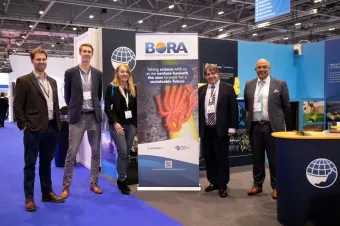
Today marks the first anniversary of BORA Blue Ocean Research Alliance, formed on 13 October 2021, between Subsea7 and the National Oceanography Centre (NOC), allowing greater ocean access for scientific research.
Ocean observations are vital to understanding the changing oceans, supporting global assessments of ocean health and developing modelling of future conditions. Despite technological advances, data gaps remain, particularly in deeper water, relating to biology, ecology and biogeochemistry.
Offshore industries operate globally, reaching geographic areas and depths where ocean observations have been lacking and, critically, make repeat operations in locations. Through BORA Blue Ocean Research Alliance, Subsea7 and the NOC are pioneering a new way of working between scientific research and industry to enable greater global access to locations and depths to gather data and develop scientific research to help advance global knowledge for universal benefit.
The foundation of ocean observations is the Essential Ocean Variables (EOV), high-impact parameters that are feasible to measure consistently from diverse platforms. In its first year, our scientists and engineers have developed BORAbox™, a system for integrating a novel microfluidics sensor package into the Subsea7 ROV fleet to measure the inorganic carbon EOV. The instruments collect data on the ocean carbonate system (a buffering system that helps to maintain the pH of seawater to within a narrow range) from the ocean sub-surface to the deep seabed and provide crucial information to understand ocean acidification across the globe.
The first BORAbox™ is successfully transmitting data from the west of Shetland, UK, from an ROV on one of Subsea7’s vessels, Normand Subsea, to NOC scientists. The results compare well with the sparse publicly available data and will expand the measurements spatially and over time. The next deployment is for offshore Brazil this November, with planned subsequent operations in Norway, the UK, Australia and around the globe. The ambition is to have more than ten operational by 2024 and doubling in coming years as support grows. The programme will provide baseline carbonate system measurements in areas with no data and the possibility to assess change over time in regions where data already exists.
The collaboration develops other ventures ranging from biodiversity, acoustic and digital imaging projects, aiming to gather data of significant scientific value. It provides a wealth of unique opportunities for local scientific research in areas where hydrocarbon and renewables industries are active, maximising the data gathering opportunity and offering an efficient solution to offshore environmental data collection.
BORA Blue Ocean Research Alliance is developing a model for how the industry can contribute to global ocean observations with many more projects now in development.